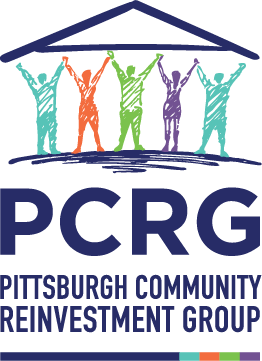LATEST DATA
CORPORATE HOUSING STUDY
August 2023
The Pittsburgh Community Reinvestment Group’s Corporate Housing Study delves into the escalating trend of housing sales to corporate entities and real estate investors in major U.S. metropolitan areas over the past decade. It found that, from 2010 to 2021, the share of houses sold to corporate entities or real estate investors in the City of Pittsburgh increased from 15.5% of sales in 2010 to 24.8% of sales in 2021 while paying a fraction of the price of regular homebuyers. The remaining communities of Allegheny County experienced a similar increase from 9.7% of sales in 2010 to 18.0% of sales in 2021.
27th ANNUAL MORTGAGE LENDING STUDY
March 2023
The Pittsburgh Community Reinvestment Group’s Annual Mortgage Lending Study provides a current portrait of mortgage lending trends in Allegheny County and the City of Pittsburgh. PCRG prepared this study using 2021 data that’s publicly available as a result of the Home Mortgage Disclosure Act (HMDA) and designed to monitor the performance of financial institutions seeking to meet their community investment requirements under the Community Reinvestment Act (CRA). The goal of publishing these findings is to ensure that policymakers and community members can better access the wealth of publicly available data to better understand the state of lending in Pittsburgh.
Black homeownership report
March 2022
The Pittsburgh Community Reinvestment Group’s Black Homeownership Report provides a look into the decline of Black homeownership in the City of Pittsburgh over the course of a decade. Pittsburgh’s Black population dropped by approximately 10,500 people, or 13.4%, from 2010 to 2020, compared to an overall 0.9% decrease in the overall population. During that same period, median home prices in the region have increased significantly, with Pittsburgh’s median home value increasing by 69.5% from $88,000 in 2010 to $149,200 in 2019. Changing dynamics in previously affordable homes have led to fears of gentrification and displacement, and a growth in sales to corporate entities has reduced the supply of quality and affordable homes available. Corporate entities made up roughly 1 in 6 single-family residential housing purchases in 2020, up from 1 in 9 in 2010, causing further housing instability for Pittsburgh’s low- and moderate-income (LMI) homebuyers.
Policy Recommendations to improve access to affordable housing across PA
April 2022
The report is prepared by graduate students of Carnegie Mellon University for PCRG. The project sought to analyze barriers to affordable housing across the Commonwealth of Pennsylvania, with a special focus on Western Pennsylvania. This report first documents a Needs Assessment, which estimates the supply and demand for affordable housing in Western Pennsylvania. This report then documents 11 major obstacles inhibiting residents from accessing affordable housing, which the team identified through ethnographic interviews with housing experts across the state. Lastly, this report outlines three key recommendation areas where the team believes progress can be made on state-level policies which would improve access to affordable housing.
26th Annual Mortgage Lending Study
June 2020
The Pittsburgh Community Reinvestment Group’s Annual Lending Study 2021 covers mortgage lending trends by local banks in the City of Pittsburgh, in the year 2018.
Taking Stock: An Increase in homeownership may be coming at a cost
September 2022
The Abandoned and Blighted Property of Conservatorship Act: 10 years of productive reuse
July 2018
24th Annual Mortgage Lending Study
June 2018
23rd Annual Mortgage Lending Study
March 2017
Housing Needs Assessment - City of Pittsburgh
2016
22nd Annual Mortgage Lending Study
2016
21st annual mortgage lending study
2015
20th annual mortgage Lending study
2014
Transit-Oriented Development Typology Strategy for Allegheny County
2013
19th Annual Mortgage lending study
2013
Goburgh Transit impact report
2012
Value capture strategies to fund street cars in Strip District and Lawrenceville
2012
Transit Revitalization Investment Districts: Opportunities and Challenges for Implementation
2011
Reinvesting in Pittsburgh's Neighborhoods: The case for transit-oriented development
2011
18th annual mortgage lending study
2011
Due Diligence Report 2010 (City of Pittsburgh Financial Institution Analysis)
2010

